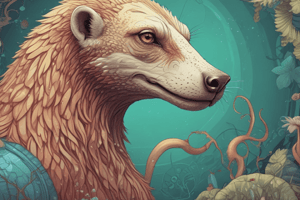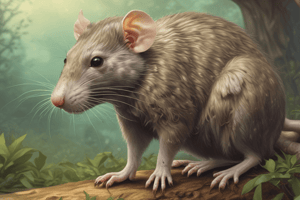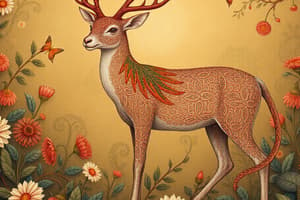Podcast
Questions and Answers
How did early humans' observations of animals primarily contribute to their survival?
How did early humans' observations of animals primarily contribute to their survival?
- By developing complex classification systems.
- By understanding evolutionary relationships.
- By creating cave sketches for documentation.
- By learning about anatomy and behavior for hunting. (correct)
What advancement did Roman and Islamic scholars contribute to the field of biology?
What advancement did Roman and Islamic scholars contribute to the field of biology?
- Classifying 540 animal species.
- Developing the theory of natural selection.
- Discovering microorganisms using microscopes.
- Advancing anatomical knowledge. (correct)
What was the primary focus of the study of nature during the Middle Ages and Renaissance, influenced by scholars like Thomas Aquinas?
What was the primary focus of the study of nature during the Middle Ages and Renaissance, influenced by scholars like Thomas Aquinas?
- Understanding the divine order of the world. (correct)
- Empirical observations of animal behavior.
- Classifying animals in a systematic manner.
- Advancing anatomical knowledge.
Which statement describes the contribution of Vesalius and William Harvey to zoology during the Renaissance?
Which statement describes the contribution of Vesalius and William Harvey to zoology during the Renaissance?
How did naturalists like Linnaeus and Buffon influence the development of evolutionary thought?
How did naturalists like Linnaeus and Buffon influence the development of evolutionary thought?
What significant contribution did Giovanni Alfonso Borelli make to the study of zoology during the Scientific Revolution?
What significant contribution did Giovanni Alfonso Borelli make to the study of zoology during the Scientific Revolution?
What was Carl Linnaeus's primary contribution to zoology during the Scientific Revolution?
What was Carl Linnaeus's primary contribution to zoology during the Scientific Revolution?
What significant concept was introduced in Charles Darwin's 'On the Origin of Species'?
What significant concept was introduced in Charles Darwin's 'On the Origin of Species'?
Which scientist's pea plant experiments led to the formulation of the laws of inheritance?
Which scientist's pea plant experiments led to the formulation of the laws of inheritance?
How did the work of Matthias Schleiden, Theodor Schwann, and Rudolf Virchow contribute to the field of zoology?
How did the work of Matthias Schleiden, Theodor Schwann, and Rudolf Virchow contribute to the field of zoology?
What discovery is James Watson, Francis Crick, and Rosalind Franklin best known for?
What discovery is James Watson, Francis Crick, and Rosalind Franklin best known for?
Which of the following best describes the focus of ethology as a branch of zoology?
Which of the following best describes the focus of ethology as a branch of zoology?
What is the primary focus of physiology as a branch of zoology?
What is the primary focus of physiology as a branch of zoology?
What is the focus of taxonomy and systematics as branches of zoology?
What is the focus of taxonomy and systematics as branches of zoology?
What does the field of genetics primarily focus on within zoology?
What does the field of genetics primarily focus on within zoology?
What is the focus of evolutionary biology as a branch of zoology?
What is the focus of evolutionary biology as a branch of zoology?
What primary aspect of animal life does developmental biology investigate?
What primary aspect of animal life does developmental biology investigate?
What is the main focus of entomology as a branch of zoology?
What is the main focus of entomology as a branch of zoology?
What is the primary focus of ornithology as a branch of zoology?
What is the primary focus of ornithology as a branch of zoology?
The study of fish, focusing on their classification, behavior, and physiology, falls under which branch of zoology?
The study of fish, focusing on their classification, behavior, and physiology, falls under which branch of zoology?
Which branch of zoology focuses on the study of amphibians and reptiles?
Which branch of zoology focuses on the study of amphibians and reptiles?
What is the primary focus of mammalogy?
What is the primary focus of mammalogy?
What aspect of zoology does parasitology primarily investigate?
What aspect of zoology does parasitology primarily investigate?
Which branch of zoology focuses on the study of diseases in animals, including their causes and spread?
Which branch of zoology focuses on the study of diseases in animals, including their causes and spread?
What key aspect of zoology does biogeography address?
What key aspect of zoology does biogeography address?
Which of the following represents a contribution of zoology to the field of psychology?
Which of the following represents a contribution of zoology to the field of psychology?
Which of the following is a focus area where zoology informs psychological studies?
Which of the following is a focus area where zoology informs psychological studies?
How does the study of ethology contribute to our understanding of animal life?
How does the study of ethology contribute to our understanding of animal life?
What did the Endangered Species Act (ESA) of 1973 aim to achieve?
What did the Endangered Species Act (ESA) of 1973 aim to achieve?
What is the significance of the Human Genome Project (1990-2003) to modern zoology?
What is the significance of the Human Genome Project (1990-2003) to modern zoology?
What is the main objective of conservation genetics, which developed in the 1990s and continues to be relevant today?
What is the main objective of conservation genetics, which developed in the 1990s and continues to be relevant today?
During which era did the rise of cell theory, embryology, and paleontology lay the groundwork for modern zoology?
During which era did the rise of cell theory, embryology, and paleontology lay the groundwork for modern zoology?
Why is an understanding of neurobiology important in the context of zoology's influence on psychology?
Why is an understanding of neurobiology important in the context of zoology's influence on psychology?
Why is the study of animal welfare and ethics important in psychological research?
Why is the study of animal welfare and ethics important in psychological research?
Which individual is recognized as the "Father of Biology" for their extensive classification of animal species and detailed observations on animal physiology and behavior?
Which individual is recognized as the "Father of Biology" for their extensive classification of animal species and detailed observations on animal physiology and behavior?
Why is understanding the principles of learning and conditioning in animals relevant to psychology?
Why is understanding the principles of learning and conditioning in animals relevant to psychology?
Which zoological discipline would be most involved in studying the evolutionary history and relationships of bird species?
Which zoological discipline would be most involved in studying the evolutionary history and relationships of bird species?
How did advancements like polymerase chain reaction (PCR) and DNA sequencing influence the field of molecular zoology?
How did advancements like polymerase chain reaction (PCR) and DNA sequencing influence the field of molecular zoology?
Flashcards
What is Zoology?
What is Zoology?
Branch of biology studying animals, structure, function, classification and distribution.
Zoology definition
Zoology definition
Scientific study of animals, including structure, function, behavior, and evolution.
Zoology and Psychology
Zoology and Psychology
Understanding the role of animal behavior.
What is Ethology?
What is Ethology?
Signup and view all the flashcards
Pre-scientific Zoology
Pre-scientific Zoology
Signup and view all the flashcards
Roman/Medieval Zoology
Roman/Medieval Zoology
Signup and view all the flashcards
18th-19th Century
18th-19th Century
Signup and view all the flashcards
Darwin
Darwin
Signup and view all the flashcards
Cro-Magnons' Zoology
Cro-Magnons' Zoology
Signup and view all the flashcards
Stone Age Zoology
Stone Age Zoology
Signup and view all the flashcards
Aristotle
Aristotle
Signup and view all the flashcards
Middle Ages Zoology
Middle Ages Zoology
Signup and view all the flashcards
Da Vinci Zoology
Da Vinci Zoology
Signup and view all the flashcards
Vesalius Zoology
Vesalius Zoology
Signup and view all the flashcards
Ulisse Aldrovandi
Ulisse Aldrovandi
Signup and view all the flashcards
Borelli (Comparative anatomy)
Borelli (Comparative anatomy)
Signup and view all the flashcards
Ray (Classification)
Ray (Classification)
Signup and view all the flashcards
Leeuwenhoek's discovery
Leeuwenhoek's discovery
Signup and view all the flashcards
Linnaeus's Taxonomy
Linnaeus's Taxonomy
Signup and view all the flashcards
Wolff's Embryology
Wolff's Embryology
Signup and view all the flashcards
Modern zoology Birth
Modern zoology Birth
Signup and view all the flashcards
Darwin's evolution theory
Darwin's evolution theory
Signup and view all the flashcards
Mendell Inheritance
Mendell Inheritance
Signup and view all the flashcards
Von Baer Embryology
Von Baer Embryology
Signup and view all the flashcards
Development of Biology
Development of Biology
Signup and view all the flashcards
DNA discovery
DNA discovery
Signup and view all the flashcards
Ecology development
Ecology development
Signup and view all the flashcards
Antibiotics discovery
Antibiotics discovery
Signup and view all the flashcards
Ethology development
Ethology development
Signup and view all the flashcards
Molecular zoology
Molecular zoology
Signup and view all the flashcards
Endangered act
Endangered act
Signup and view all the flashcards
Human genome project
Human genome project
Signup and view all the flashcards
Conservation genetics
Conservation genetics
Signup and view all the flashcards
Morphology
Morphology
Signup and view all the flashcards
Physiology
Physiology
Signup and view all the flashcards
Ethology
Ethology
Signup and view all the flashcards
Ecology
Ecology
Signup and view all the flashcards
Taxonomy / Systematics
Taxonomy / Systematics
Signup and view all the flashcards
Genetics
Genetics
Signup and view all the flashcards
Evolutionary Biology
Evolutionary Biology
Signup and view all the flashcards
Study Notes
- The objectives of the lesson are to discuss the historical developments that shaped Biology and Zoology, and to explain the focus and importance of each branch of zoology in understanding animal life.
Definition of Zoology
- Zoology is a branch of biology that studies animals, including their structure, function, classification, and distribution (E.S Russell, 1916).
- Zoology is the scientific study of the animal kingdom, covering living and extinct animals, their structure, behavior, physiology, and evolutionary relationships (Peter J. Herring, 2002).
- Zoology focuses on the study of animals, exploring their anatomy, physiology, and ecology within an evolutionary context (Lars L. Jensen, 2008).
- As a branch of biology, zoology focuses on the scientific study of animals, including their structure, function, behavior, physiology, development, evolution, and ecology, encompassing the study of living and extinct animals and their interactions with their environments.
Importance of Zoology to Psychology
- Zoology is important in understanding animal behavior and its influence on human psychology.
- Zoology studies neurobiology and the brain-behavior relationship.
- Ethology and social behavior from a zoological perspective contribute to psychology.
- Learning and conditioning principles are studied in both zoology and psychology.
- Evolutionary psychology has roots in zoological studies.
- Psychological disorders can be studied using animal models.
- Zoology informs the study of human and animal sensory perception.
- Animal welfare and ethics are relevant in psychological research.
- Zoology contributes to psychopharmacology and behavioral health.
- Therapeutic interventions in psychology can involve the use of animals.
Historical Background of Zoology
- The historical background of Zoology involves early observation and primitive understanding, Greek and Romance influence, Middle Ages and Renaissance, The Scientific Revolution, and Modern Zoology
Early Observation and Primitive Understanding
- Cro-Magnons documented animals through etchings and cave sketches, such as deer, fish, and reindeer.
- In the Stone Age, which lasted from 1.8 million to 18,000 BC, wall paintings and engraved bones featured animals with deer reproduction being an example.
Greek and Romance Influence
- Aristotle (384–322 BC), known as the father of biology, classified 540 animal species
- Aristotle made detailed observations on animal physiology and behavior.
- Aristotle wrote "Historia Animalium" (History of Animals).
- Aristotle devised the 1st classification system, grouping animals into blooded and non-blooded.
Middle Ages and Renaissance
- During the Scholasticism and Natural Philosophy period (12th-15th century), Thomas Aquinas reconciled Aristotle’s classical knowledge with Christian theology.
- The study of nature, including animals, was increasingly seen as a way to understand the divine order; the focus was on theological interpretations rather than empirical observations.
- Leonardo da Vinci made detailed anatomical sketches and observations on the internal structure of animals, including dissections of various species, during the 15th century.
- In 1543, Andreas Vesalius published "De humani corporis fabrica", a detailed anatomical study of the human body, which contributed to the understanding of animal anatomy through dissections.
- Early naturalists like Ulisse Aldrovandi (1522-1605) began classifying animals in a more systematic manner.
- Ulisse Aldrovandi laid the groundwork for later taxonomists like Carl Linnaeus.
- Carl Linnaeus formalized classification systems in the 18th century.
The Scientific Revolution
- During the 16th-17th century, Giovanni Alfonso Borelli (1608–1679) and other scientists advanced animal anatomy by conducting systematic dissections and comparing different species.
- Naturalists like John Ray (1627–1705) began to classify animals systematically in the 17th century.
- Antoni van Leeuwenhoek discovered microorganisms using a microscope in 1676.
- In 1735, Carl Linnaeus published "Systema Naturae", a comprehensive classification system for animals and plants.
- Linnaeus introduced the binomial nomenclature system, using two Latin names to identify species.
- While not fully developed during the Scientific Revolution, early ideas about species change were being discussed by figures like Georges-Louis Leclerc, Comte de Buffon (1707–1788) in the 1750s.
- Caspar Friedrich Wolff (1734–1794) published "Theoria Generationis" in 1759, which challenged the idea of preformation and laid the foundations of modern embryology.
- The 18th Century saw an increasing interest in the study of animals, with significant contributions from naturalists such as Georges Cuvier and Jean-Baptiste Lamarck.
Modern Zoology
- Charles Darwin published "On the Origin of Species" in 1859, introducing the theory of natural selection.
- Gregor Mendel formulated the laws of inheritance (dominant and recessive traits) through his pea plant experiments in 1865.
- Karl Ernst von Baer (1828) and Ernst Haeckel (1866) contributed to comparative embryology in the 19th Century
- Matthias Schleiden and Theodor Schwann developed cellular theory in the 1830s.
- Rudolf Virchow's work in the 1850s established the cell as the basic unit of life.
- James Watson, Francis Crick, and Rosalind Franklin discovered the structure of DNA in 1953.
- Ernst Haeckel (1869), Charles Elton (1927), and G. Evelyn Hutchinson (1940s-50s) formally developed ecology as a distinct scientific discipline.
- Alexander Fleming discovered penicillin in 1928.
- Konrad Lorenz, Nikolaas Tinbergen, and Karl von Frisch founded the field of ethology (animal behavior study) in the 1930s-1970s.
- Molecular techniques in zoology, including polymerase chain reaction (PCR) and DNA sequencing, were introduced in the 1970s.
- The United States passed the Endangered Species Act (ESA) in 1973 to protect animal species at risk of extinction.
- The Human Genome Project, completed in 2003, mapped the entire human genome (1990-2003).
- The development of conservation genetics involves the application of genetic tools to study and protect endangered species (1990s-Present).
Branches of Zoology
- Morphology studies the form and structure of animals, investigating physical appearance, internal structures, and external features, such as the skeletal structure of vertebrates.
- Physiology studies animal functions and processes, focusing on how organs and systems function, including digestion, respiration, circulation, and reproduction, such as how the human heart pumps blood.
- Ethology studies animal behavior, investigating animals in natural environments and both instinctive and learned behaviors, such as the social behavior of wolves or primates.
- Ecology studies the relationship between animals and their environments, focusing on animal populations, ecosystems, and interactions with habitats and species, such as coral reef ecosystems.
- Taxonomy and Systematics involves classifying and naming animals based on their characteristics and evolutionary relationships, such as classifying a new bird species.
- Genetics studies heredity and genetic variation in animals, investigating how traits are inherited and how genetic variations contribute to evolution and diversity, such as studying genetic disorders in animals.
- Evolutionary Biology studies the origins and changes in the diversity of life, looking at how species evolve and adapt through natural selection and genetic changes, such as research on Darwin's finches.
- Developmental Biology studies how animals grow and develop, focusing on how embryos form, differentiate, and mature into adult organisms, such as the embryonic development of frogs or birds.
- Entomology studies insects, focusing on their behavior, ecology, classification, and physiology, such as studying honeybee behavior or mosquito lifecycles.
- Ornithology studies birds, looking at their physiology, behavior, ecology, and evolution, for example, studying bird migration patterns or the anatomy of flight.
- Ichthyology studies fish, focusing on classification, behavior, and physiology, like the behavior of salmon or biodiversity in coral reefs.
- Herpetology studies amphibians and reptiles, investigating their biology, ecology, and evolution, such as studying frog behavior and habitat or the conservation of endangered reptiles.
- Mammalogy studies mammals, studying anatomy, physiology, behavior, and evolution, such as elephant herds or the behavior of primates.
- Parasitology studies parasites and parasitism, focusing on parasite biology and interactions with host organisms, such as tapeworms or malaria-causing Plasmodium.
- Pathology studies diseases in animals, looking at the effects, causes, and spread of diseases, such as viral infections in wildlife or livestock.
- Biogeography studies the distribution of species across geographical regions, investigating how animals are distributed around the world and the factors influencing their locations, such as the presence of penguins in Antarctica.
Studying That Suits You
Use AI to generate personalized quizzes and flashcards to suit your learning preferences.




